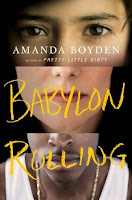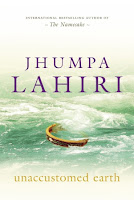 Shall I be honest? I mean utterly, unflinchingly honest? I almost put this book down after the first page after the prologue. Amanda Boyden’s second novel, Babylon Rolling starts off with a love letter of sorts to New Orleans, beleaguered already prior to Katrina and devastated afterwards, and it’s touching if a bit affected, the use of the pronoun “we” and all that, and then the book itself carries on like a thunderclap before a storm. She’s a powerful writer — there’s no denying it. When I finished the novel on the way home, there were tears in my eyes.
Shall I be honest? I mean utterly, unflinchingly honest? I almost put this book down after the first page after the prologue. Amanda Boyden’s second novel, Babylon Rolling starts off with a love letter of sorts to New Orleans, beleaguered already prior to Katrina and devastated afterwards, and it’s touching if a bit affected, the use of the pronoun “we” and all that, and then the book itself carries on like a thunderclap before a storm. She’s a powerful writer — there’s no denying it. When I finished the novel on the way home, there were tears in my eyes.
Now I’m going to digress. I know I’m sick of how much I’ve been talking about The Wire lately so I can only imagine how sick the rest of the world must be (listen me, the world, pshaw). For someone who doesn’t live in the middle of a raging gang war or a city almost overrun by crime, I always feel there’s an authenticity to The Wire that could be horribly misplaced. It’s an ivory tower appreciation for something I have never experienced; the “realness” of it makes me feel like I’m involved in some way in the defeat of human society, if we’re being honest. ‘It’s not a war,’ The Wire keeps reminding us, ‘because no one wins.’ And this theme, the decay of civilization, in a way, pervades much of Babylon Rolling: people cheat on their spouses, horrible and traumatic accidents happen, dope slingers and their gangster counterparts reign in some corners, and tragedy seems to define a place that hasn’t even seen the worst of it, the hurricane hasn’t even hit yet.
But I felt like Fearius, the self-given nickname of a young boy christened Daniel, whose voice is written much like the dialogue in The Wire, wasn’t as authentic as I would have imagined he could and/or should have been. So I found him and his bad grammar and his lack of punctuation and his misapprehension of vocabulary a little off-putting in ways that I would have never criticized had I watched him in the television show. Yet, the other characters, some mentally challenged, others simply lost, were so completely whole that it kind of made up for Fearius’s terribly annoying everythingness.
I loved Cerise, a 70-year-old grandmother who loves her husband so fiercely she endangers her own life to save him, and her voice broke my heart all over the place. The simplicity and wisdom from which she lives her life is inspiring. The troubled marriage of Ed and Ariel reminded me a little of Tom Perrotta, and their actions not only underscored the main themes of the book, but they heightened the whole sense of troubled America in microcosm. But like Fearius, I felt Philomenia was a little over the top at times. The idea that all of these people live on the same street and that so much happens to them felt contrived, a little too Crash for me. But I can’t say I didn’t get caught up in the story and I can’t deny that there’s a powerful strength of voice to the book. I’m glad, too, that I didn’t put the book down after the first few pages. It certainly showed me, didn’t it?
READING CHALLENGES: Babylon Rolling is one of my Cleaning Out the Closet challenge books. That’s one down and 19 more to go, and since Boyden was born in Minnesota, I’m counting this book as the United States for Around the World in 52 Books too. I’m sure as sh*t not going to get stuck reading so few countries this year. It’s not exactly cheating to knock off all the easy ones first, is it?
WHAT’S UP NEXT: Blogging “The Fall of the House of Usher” for 1001 Books, I finished it too this evening. And reading? Who knows. I’ll wait until something calls for me.







